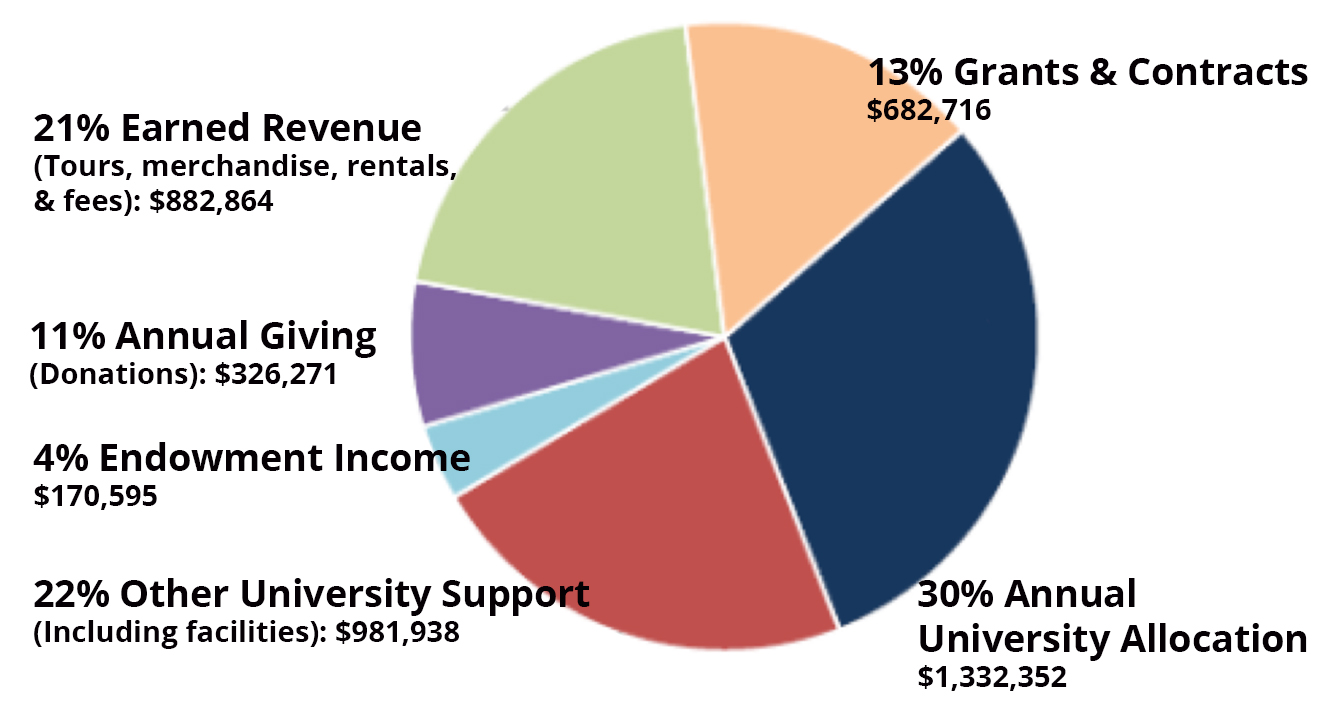Are lemurs at risk from the COVID-19 virus?
The DLC is taking every precaution to ensure the health of all of our primates, humans and lemurs alike. In 2020, a study of non-human primates showed that some monkeys could be infected by COVID-19 and experience mild symptoms; and in January 2021, gorillas housed at the San Diego Zoo Safari Park tested positive for the coronavirus. Currently there is no evidence of lemurs having been infected by COVID-19.
Has the Lemur Center reopened for tours?
We’re thrilled to announce that beginning June 4, the DLC will be open for limited tours by prepaid reservation. Guests must wear masks at all times while onsite, and we cannot accommodate walk-ins. To learn more, check availability, and purchase tickets online, please visit our onsite tours homepage.
How did the DLC prepare for the outbreak?
As part of its accreditation through the Association of Zoos and Aquariums and AAALAC International, the DLC has Standard Operating Procedures (SOPs) already in place for a variety of events ranging from ice storms and hurricanes to power outages and, yes, even disease outbreaks. “When you’re caring for one of the most precious collections of endangered primates anywhere in the world,” says director Greg Dye, “there’s a whole host of things you prepare for.”
Additionally, the DLC actively works with the Duke Animal Program, which has a specified pandemic response as part of its business continuity and disaster plan, and with Duke’s attending veterinarian, Dr. John Norton, to minimize any risks to the health and safety of the animals. Each of our veterinarians—Bobby Schopler, D.V.M., Ph.D.; Laura Ellsaesser, D.V.M.; and Cathy Williams, D.V.M.—is a member of the American Association of Zoo Veterinarians. In addition, the DLC’s supervising veterinarian, Dr. Schopler, has a Ph.D. in epidemiology and is highly knowledgeable of epidemics and the control and spread of disease.
Early on, the DLC began operating on our “essential personnel only” protocol, which is designed to minimize the spread of a contagious agent. All onsite volunteer duties were suspended, and onsite tours, camps, and events were cancelled. Arrangements were made with vendors to ensure adequate food and supplies (bedding, medications, etc.) in case supply chains were interrupted. All Duke Lemur Center staff working onsite are COVID-tested weekly as part of Duke University’s surveillance testing program, and symptom monitoring is required daily.
Special note re: drop-off donations of enrichment items: To eliminate potential animal exposure from outside sources, we have suspended our practice of utilizing donated household enrichment items, including homemade enrichment toys, cardboard boxes, fleece, or denim pockets. Instead, we are only accepting items that are pre-packaged and sealed by the manufacturer. Enrichment is an essential part of lemur welfare, and we have identified raw materials that can be shipped directly to the DLC via our amazon.com wishlist. If you would like to donate enrichment materials or other supplies, we would very much welcome your donations via the wishlist!
What about tours and other events?
Onsite tours: We’re thrilled to announce that beginning June 4, the DLC will be open for limited tours by prepaid reservation only! Guests must wear masks at all times while onsite. To learn more, check availability, and purchase tickets online, please visit our onsite tours homepage.
Virtual tours and other online content: Visit the Lemur Center from the comfort of your own home! Please visit our Virtual Programs homepage to explore current options, which range from free lessons and tours to weeklong camps and premium customizable experiences.
Gift shop: We’re excited to announce contact-free curbside pick-up for merchandise purchases, and NEW online sales with free shipping in the US! All purchases “give back” to the lemurs at the DLC, helping fund the Education Department and paying for lemur care, housing, veterinary supplies, and conservation initiatives. Visit our merchandise homepage for more details and to browse our catalog of available merchandise.
Camps: In accordance with Duke policy, all onsite summer programs enrolling pre-college students (minors) are cancelled through summer 2021. We are currently accepting reservations for the VIRTUAL version of our popular Leaping Lemurs Summer Science Camp, open to rising 4th- through 6th-grade students across the US.
Internships: We were unable to host our summer internship program in 2021, due to COVID-19. Applications for summer 2022 will be posted in January 2022.
Although the Lemur Center is closed to visitors, our expert care of our animals continues. For easy ways you can help us provide the highest quality of care for our lemurs even during these difficult times, please see Ways to Help during COVID-19. The Duke Lemur Center receives 21% of its annual budget from educational programs, events, and merchandise sales. With the disruption of our tour and merchandise income and cancellation of fundraising events like Lemurpalooza, your gift will mean more than ever to us!
How can I help?
Unrestricted gifts always help us to address our priority needs, from caring for the lemurs to repairing enclosures damaged by storms, to providing training opportunities for our animal technicians. These are all areas that revenues from our tours typically provide. To donate, click the button above. Your gift will help!
For easy ways you can help us provide the highest quality of care for our lemurs even during these difficult times, please see Ways to Help during COVID-19. We receive 21% of our annual budget from educational programs, events, and merchandise sales. With the disruption of our tour and merchandise income, your gift will mean more than ever to us!
We would greatly appreciate donations via our amazon.com wishlist, which includes items needed to create daily enrichment items now that we can no longer accept household donations. Items purchased from the wishlist should be shipped directly to the Duke Lemur Center’s enrichment department: 3705 Erwin Road in Durham, NC 27705.
This chart (above; click for a larger view) shows sources of revenue for the Duke Lemur Center in a typical year. However, because of COVID-19, 2020 is anything but typical. The DLC earns 21% of its revenue from tours, merchandise sales, facility rentals, and fees. With the disruption of our tour and merchandise income and cancellation of camps and events like Lemurpalooza, your support means more than ever to us! To see more about the DLC’s financial overview, please see our 2019 stewardship report.
How is work in Madagascar being impacted?
The DLC’s work in Madagascar is focused on capacity building—empowering local Malagasy communities to protect and care for Madagascar’s forests and wildlife. Thanks to our Malagasy staff and the support of local communities, we’re proud that our work on the island will continue whether our US-based conservation staff are there or not. Our annual conservation newsletter outlines our projects and progress in Madagascar in 2020.
That said, with the COVID-19 pandemic crippling the globe and especially sub-Saharan Africa, the race to sustain people and nature in Madagascar has become increasingly difficult. In this article published in December 2020, DLC conservationist and researcher James Herrera writes about the state of Madagascar conservation at the end of 2020 and looking forward into the new year.
The DLC’s conservation projects are run exclusively on grants and donor funding. If you would like to support our work in Madagascar, please consider making a tax-deductible donation.
For more information
Please visit Duke’s Coronavirus Response website for university-wide information and updates.
Photo essay
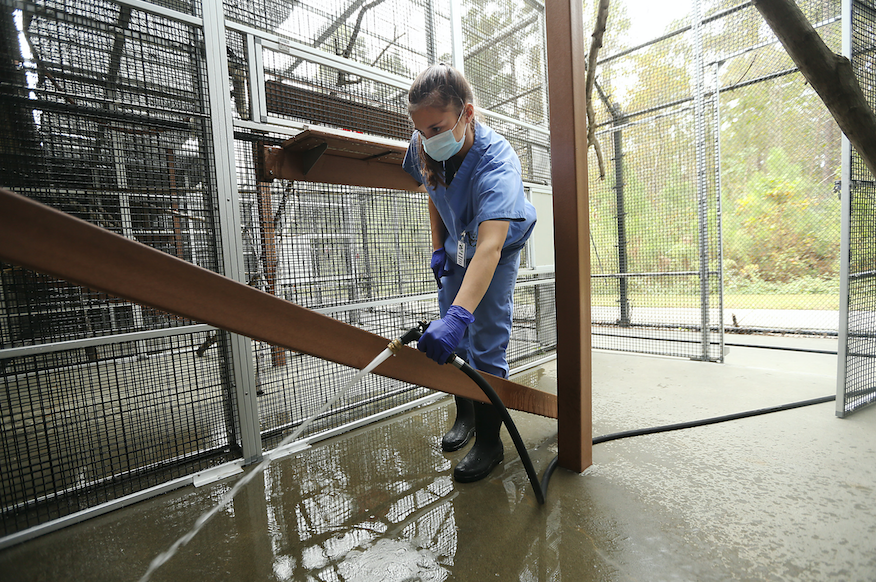
DLC staff are, as always, taking precautions to ensure the minimum amount of germ transfer, including the use of gloves, masks, and other protective equipment. All Duke Lemur Center staff working onsite are COVID-tested weekly as part of Duke University’s surveillance testing program, and symptom monitoring is required daily. All onsite tours, camps, and other events have been cancelled, and the DLC is closed to visitors.
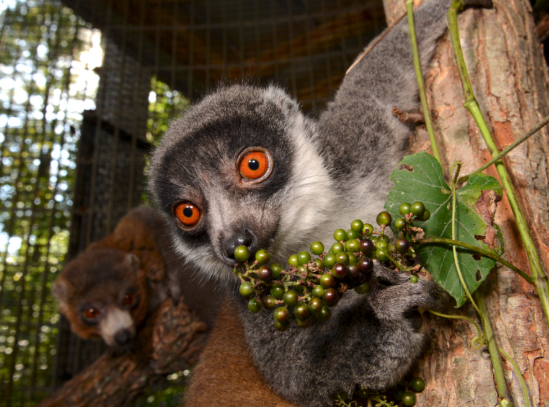
The DLC has Standard Operating Procedures in place for a variety of events, ranging from ice storms and hurricanes to power outages and, yes, even disease outbreaks. The H1N1 pandemic (2009) provided an opportunity to evaluate and further refine the Lemur Center’s SOPs for viruses.
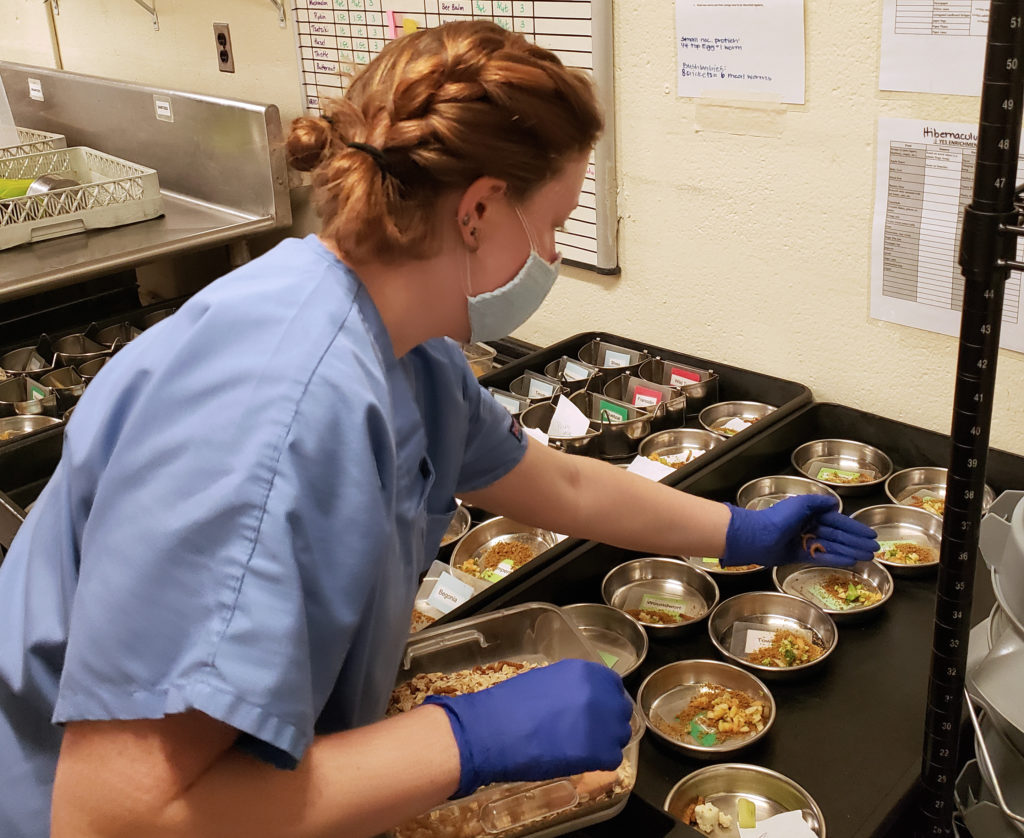
With tours cancelled until further notice, Lead Education Technician Faye Goodwin — who is also trained in animal care — lends a hand counting mealworms for our nocturnal lemurs’ daily diets.
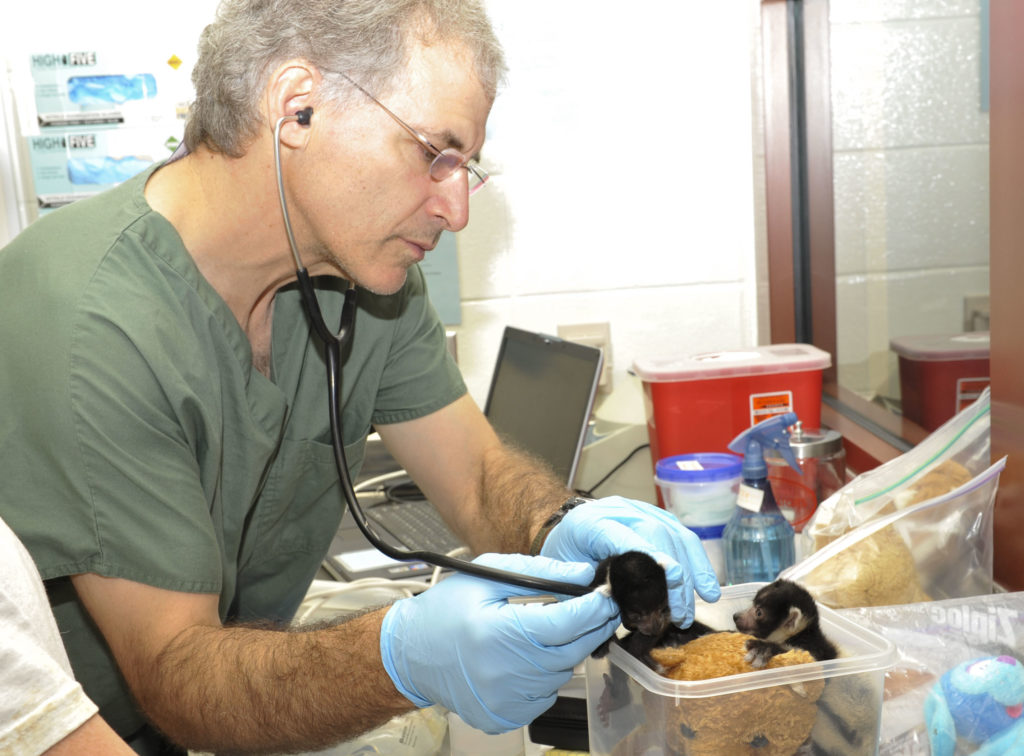
Bobby Schopler, D.V.M., Ph.D., is the Duke Lemur Center’s supervising veterinarian. In addition to 14 years’ experience treating the DLC’s lemurs, he has a Ph.D. in epidemiology and is highly knowledgeable of epidemics and the control and spread of disease.
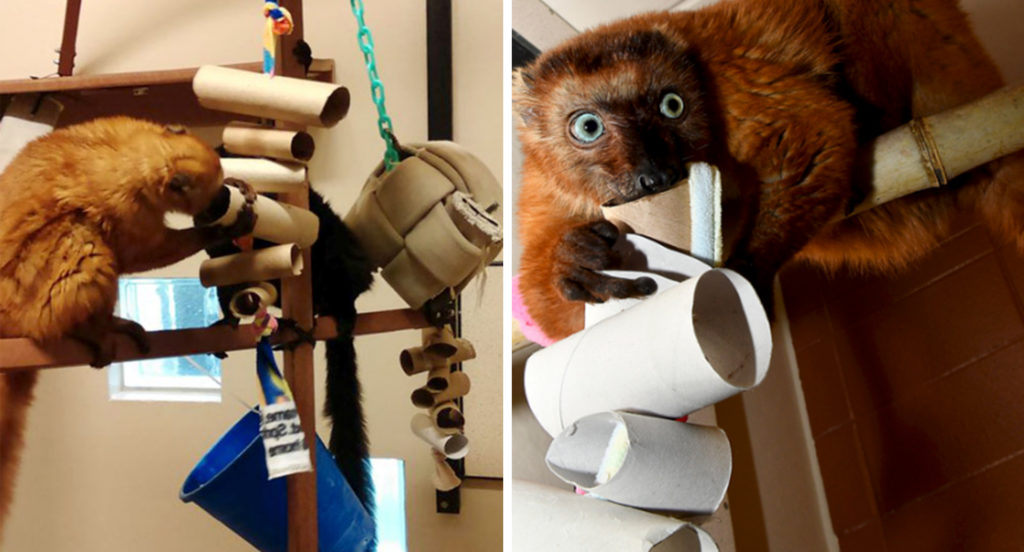
Cardboard rolls tied together with fleece are great for hiding food in and are a favorite source of enrichment for our lemurs. Because we can no longer accept donations of household items like paper towel rolls to create these feeders, we would very much welcome donations of raw materials purchased from our amazon.com wishlist and shipped directly to the DLC.


